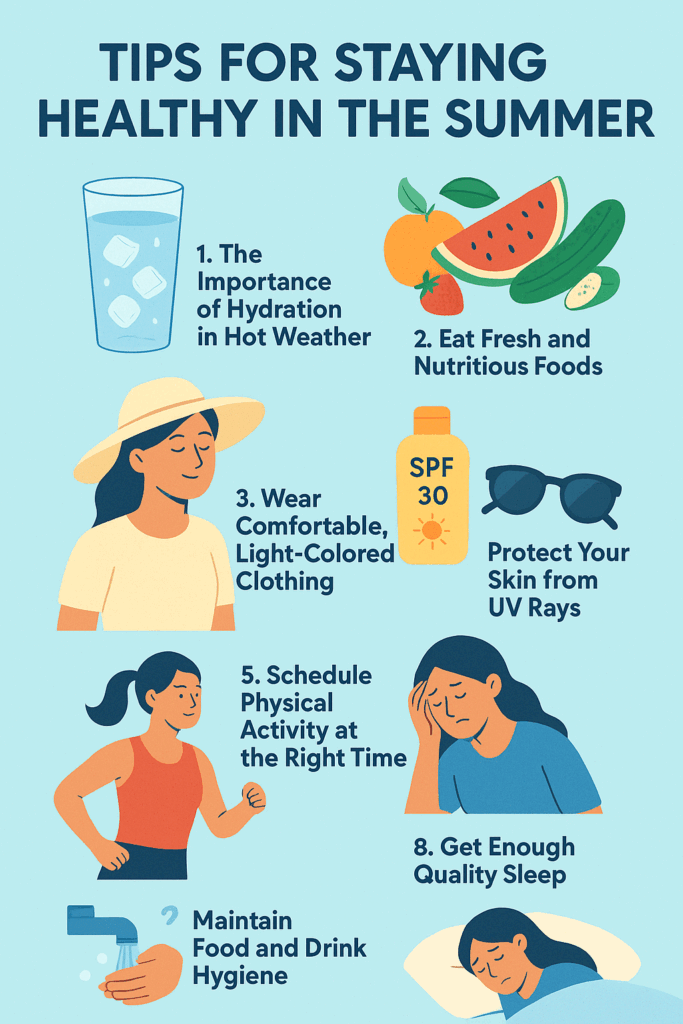Pixie Forever – Summer is often associated with sunny weather, outdoor activities, and a more active lifestyle. However, high temperatures can trigger various health issues if the body is not properly cared for. Therefore, tips for staying healthy are essential to understand and apply so we can remain fit, energetic, and free from health risks.
In this news article, we will discuss a complete guide to facing the summer safely and comfortably, from diet and hydration to skin protection.
1. The Importance of Hydration in Hot Weather
Dehydration is one of the main risks during summer. High temperatures cause the body to lose fluids more quickly through sweat. Drinking at least 8 glasses of water a day is a basic step that should not be overlooked.
In addition to plain water, you can also consume electrolyte drinks to replace lost minerals, especially if you engage in intense physical activity. Avoid excessive sugary or caffeinated drinks as they can accelerate dehydration.

2. Eat Fresh and Nutritious Foods
Summer is the perfect time to enjoy fresh fruits such as watermelon, melon, oranges, and strawberries, which are rich in vitamin C and water content. Vegetables like cucumbers, tomatoes, and lettuce also help maintain body hydration from within.
Choose foods that are low in saturated fat and high in fiber to aid digestion. Spicy foods should be limited as they can raise the body’s internal temperature.
3. Wear Comfortable, Light-Colored Clothing
Dark-colored clothing absorbs more heat, making the body feel hotter. Light colors like white or pastel shades reflect sunlight and help maintain a stable body temperature.
Choose lightweight, breathable fabrics such as cotton or linen. Don’t forget a hat or umbrella when outdoors for extra protection.
read more : “The Global Cost of Living: A Threat to Economies Worldwide“
4. Protect Your Skin from UV Rays
Excessive ultraviolet (UV) exposure can cause sunburn, premature aging, and even skin cancer risk. Use sunscreen with at least SPF 30, and reapply every 2 hours or after sweating.
Additionally, sunglasses with UV protection can protect your eyes from harmful radiation. Protect your lips with SPF lip balm to prevent dryness or cracking.
5. Schedule Physical Activity at the Right Time
Exercise remains important in summer, but timing matters. Avoid working out during midday when temperatures peak. Choose mornings or evenings when it’s cooler.
If you must be outdoors, take regular breaks and stay hydrated. Overexertion in hot weather can lead to heatstroke or heat exhaustion.
6. Be Aware of Heatstroke Symptoms
Heatstroke is a medical emergency that occurs when the body overheats and cannot cool down. Symptoms include dizziness, flushed skin, reduced sweating, rapid pulse, and even loss of consciousness.
If these signs appear, immediately move to a cooler place, drink water, and loosen clothing. In severe cases, seek medical help right away.
7. Maintain Food and Drink Hygiene
Hot weather can accelerate bacterial growth in food. Make sure food is properly cooked and stored safely. Avoid consuming food that has been left out in the open for too long.
Wash your hands before eating or after touching items outside the home to prevent the spread of illness. Cleanliness plays a vital role in tips for staying healthy, especially in high temperatures.
8. Get Enough Quality Sleep
Adequate sleep helps the body recover energy after a day of activities. Hot weather often disrupts sleep quality, so ensure proper air circulation in your bedroom.
Use fans or air conditioning, and choose lightweight bedding that absorbs sweat. Reduce caffeine or heavy meals before bed to help the body relax.
9. Prepare a Family Protection Plan
Summer health is not only about yourself but also about those around you. Ensure children, the elderly, and other vulnerable family members receive extra protection.
Teach them the importance of drinking water, using skin protection, and recognizing signs of heat exhaustion. With proper preventive steps, the risk of illness can be minimized.



